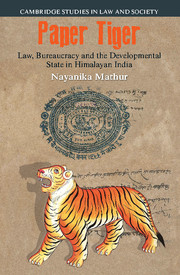Book contents
- Frontmatter
- Dedication
- Contents
- List of Figures
- Glossary
- Acronyms
- Acknowledgements
- Map
- Prologue
- Introduction
- 1 A Remote Town
- The Paper State
- 2 The State Life of Law
- 3 The Material Production of Transparency
- 4 The Letter of the State
- 5 Meeting One Another
- Paper Tiger?
- Conclusion: The State as a Paper Tiger
- References
- Index
4 - The Letter of the State
from The Paper State
Published online by Cambridge University Press: 05 October 2015
- Frontmatter
- Dedication
- Contents
- List of Figures
- Glossary
- Acronyms
- Acknowledgements
- Map
- Prologue
- Introduction
- 1 A Remote Town
- The Paper State
- 2 The State Life of Law
- 3 The Material Production of Transparency
- 4 The Letter of the State
- 5 Meeting One Another
- Paper Tiger?
- Conclusion: The State as a Paper Tiger
- References
- Index
Summary
Bertolt Brecht famously advocated stripping the familiar of its inconspicuousness through estrangement. A typical day in the life of the NREGS cell requires little effort to make it strange. For, even though it consists of familiar practices of the type de Certeau (1988) has described as those that ‘produce without capitalising’ – reading, writing, talking, filing, attending meetings, drinking chai – the repetitive and invariable nature of the work with its extreme reliance on paper lends it, on the first encounter, a somewhat odd hue.
Chamoli district's development apparatus is split into two institutions – the District Rural Development Agency (DRDA), which is funded from New Delhi, i.e., by the Centre; and the Vikas Vibhag (Development Department), which is funded by the State of Uttarakhand. Their distinction is rigidly maintained, even physically – the two institutions are housed in separate buildings, though they are both directly controlled by the district's Chief Development Officer (CDO) and, ultimately, by the District Magistrate (DM). Being a Centre-sponsored scheme, the NREGS had a room allotted to it in the DRDA, which was located directly opposite the DM's office. This tiny space contained two tables, five chairs, a map of Uttarakhand on the wall, and a window that opened on to the distracting sight of a bright blue dhaba (tea-stall). On the tables and on every available inch of floor space, files were neatly arranged. In March 2007, this cell was allocated a computer, in order that the statistics being generated out of the NREGS could be consigned to permanence through their entry into the virtual world. For the first 2 months after its arrival, this computer was kaput. A new one, eventually, made its way up from Dehradun. As this one was functional, we had to find a ‘computer boy’ (computer-wallah ladka), since nobody in the office knew how to operate this strange device. A rather fraught process ensued, involving an advertisement, applications, shortlists, interviews, and much ‘political pressure’ being exerted on officials in favour of a particular candidate. Finally, the NREGS cell appointed a ‘computer boy’. The computer boy could type but not write letters for, as I explain below, that is an art (kala) demanding slow inculcation. There was no internet connection, so the computer was mostly used to play games on and, sometimes, watch DVDs. All the work took place with and on paper.
- Type
- Chapter
- Information
- Paper TigerLaw, Bureaucracy and the Developmental State in Himalayan India, pp. 97 - 116Publisher: Cambridge University PressPrint publication year: 2015



